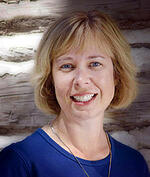New business owners may miss the ability to brainstorm and solve problems with co-workers -- people who understand the business intimately and can challenge our own assumptions.
.jpg?width=129&height=137&name=linkedin_logo_(2).jpg) Chamber meetings and LinkedIn groups facilitate some helpful exchanges, but it’s not quite the same as talking with someone in the same business. Needless to say, competitors aren’t too keen to brainstorm together. Finding a mentor who wants to learn all about our business and advise us personally sounds great, but is tough to implement in practice and to sustain over time.
Chamber meetings and LinkedIn groups facilitate some helpful exchanges, but it’s not quite the same as talking with someone in the same business. Needless to say, competitors aren’t too keen to brainstorm together. Finding a mentor who wants to learn all about our business and advise us personally sounds great, but is tough to implement in practice and to sustain over time.
How does a small business owner find an active, engaged community of people who really understand the unique challenges of ownership and can offer solid advice from real-life lessons learned?
We think we have found the answer, at least for Great Harvest bakery owners who want to build a profitable small business that serves great tasting whole wheat bread. We call it our Freedom Franchise and Learning Community business model.
Long before Peter Senge published The Fifth Discipline: The Art and Practice of The Learning Organization, our humble “learning organization” was encouraging each local franchisees to try new things and then share their successes and failures with each other. Though as any community manager knows, there is more to any successful community than just “encouraging” people to share.
We set up our franchise system from the beginning with these key aspects:
- Give true operational freedom with very few rules
- Select people who want the responsibility to define their own vision
- Connect everyone together and expect them to learn from each other.
Senge identified that commitment to “seeing our organizations as vehicles for change” is part of the key to a successful learning organization. This helps explain why our learning community thrives. People who leave their corporate jobs and established careers to become whole grain bakery owners in their neighborhoods truly believe they can create a better business organization than the one they left. And they are definitely committed – the majority of their life savings are on the line.
And how does a local retail bakery owner build a better business? By learning from customers, employees and, most importantly, other Great Harvest bakery owners.
Sounds great in theory, right? The reality is that productive and meaningful sharing and learning doesn’t just happen spontaneously. It needs to be nurtured and facilitated. That is where we see our important role as the franchisor in the whole system.
We spend a significant amount of our resources to facilitate the Learning Community. Here are some specific examples:
- Online community: bakery owners can log-in to download information, post a question for other owners or search the archive of discussions. We spend time adding valuable content to the community and keeping the technology maintained.
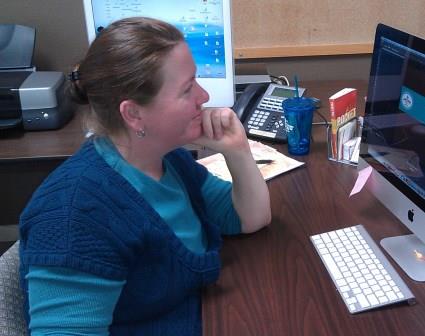
Graphic artist Christy Stauffenberg uploads information for bakery owners.
-
Annual convention: periodic face to face interactions go a long way to making online sharing more effective. We’ve held an annual meeting for bakery owners every year since 1993. Tons of networking happens at the meals, sessions and in the hallways. At our April 2013 convention, we organized roundtables one afternoon just for owners to gather around specific topics. The topics came from a survey of bakery owners and included topics such as marketing, profitability and sales growth.
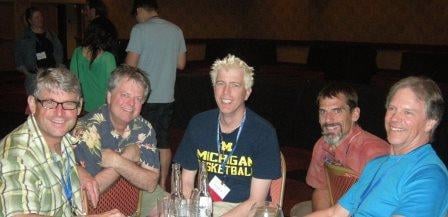 Owners of the Anchorage, AK, Colorado Springs, CO, Northville, MI, Lafayette, LA and Great Falls, MT bakeries compare notes at convention
Owners of the Anchorage, AK, Colorado Springs, CO, Northville, MI, Lafayette, LA and Great Falls, MT bakeries compare notes at convention -
Initial training: including existing owners with franchise staff throughout the initial training helps new bakery owners get a jump start on establishing their personal network within Great Harvest. We also teach new owners how to find information and we highlight role models in the system.
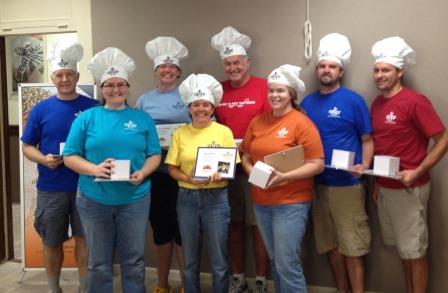 New bakery owners from Texas, Minnesota, Pennsylvania and North Carolina graduate from training helped by the guidance of Zach England, Boise, ID bakery owner
New bakery owners from Texas, Minnesota, Pennsylvania and North Carolina graduate from training helped by the guidance of Zach England, Boise, ID bakery owner - Individualize learning plans: Once bakery owners have graduated from this intense tracking and visiting stage, they can choose from a menu of options for learning new skills and tactics each year. This year the options included bringing an expert on a topic to a bakery, subsidizing travel to the annual convention, traveling out to visit another Great Harvest bakery, attending a seminar, and organizing or attending a regional meeting with bakery peers.
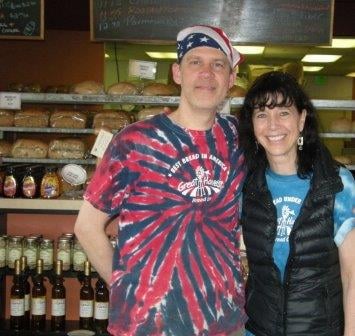 Great Harvest bread quality expert Bonnie Harry with Bill Cunningham, McMinnville, OR.
Great Harvest bread quality expert Bonnie Harry with Bill Cunningham, McMinnville, OR.
How does the Learning Community look from the franchise office perspective? Often chaotic. Simultaneously frustrating and thrilling. Frustrating when our role as facilitator is misunderstood and when our ego gets in the way. Thrilling as we look back over time and see how the system as a whole has evolved.
Daily, we attempt to embrace, live and explain the paradox between quality and freedom.
We have our own strong opinions based on years of experience about what makes high quality products and profitable small businesses. It’s painful to watch new bakery owners repeat the same mistakes other owners made before them. The allure of a command-and-control structure to prevent these mistakes is strong.
The long term benefit of preventing that individual mistake is actually smaller than the cost to the whole of restricting everyone’s freedom. And that counterintuitive reality is tough to embrace and explain when the cost of the mistake is personal and immediate, while the benefit of the freedom to make mistakes is communal and enduring.
It’s a constant balancing act. Thankfully, we have a lot of smart and committed local bakery owners navigating the Learning Community with us.
Learn More About Bakery Cafe Ownership with Great Harvest:
Senge quote:
Learning Organizations, edited by Chawla and Renesch, "Communities of Commitment: The Heart of Learning Organizations" by Kofman and Senge, p. 17.



